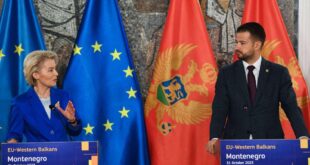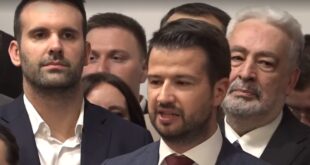EU Enlargement Commissioner Stefan Fuele said that Montenegro was facing a more demanding EU integration phase full of challenges, and that concrete results were necessary in the fight against corruption and organised crime in the country.
Addressing reporters after meeting with top Montenegrin officials, Fuele said that Montenegrin reform efforts must be more comprehensive as the EU integration process becomes more demanding and new challenges present themselves.
“The good news is that these reforms are necessary in any case. Things such as fighting corruption and organised crime, strengthening the rule of law, and strengthening administrative capacity are all things that are necessary for your citizens,” the commissioner said.
Fuele started his first Western Balkans tour in his new post on Wednesday with Belgrade as his first stop. On Thursday he visited Bosnia and Herzegovina and Montenegro, and he will end his trip in Albania and Kosovo on Friday.
The aim of the visit is to offer support to the countries and provide the region with political direction in its efforts to join the EU.
Montenegrin Prime Minister Milo Djukanovic said on the occasion that the government’s priority is to fulfill political criteria which will bring Montenegro closer to the EU and NATO. As for the government’s other priorities, he cited improving the business environment, eliminating business barriers to economic development and improving regional cooperation.
“I believe and I want to reiterate before you the commitment of the government, parliament, judicial authorities, president, civil sector, and the entire population of Montenegro to our European perspective.
“The coming years will lead to rapid progress and the rapid realisation of our European and Euro-Atlantic perspective. I believe that in 2010 an ambitious goal will be achieved: Montenegro will obtain candidate status, which will mark the beginning of negotiations with the European Commission on membership,” Djukanovic said.
Montenegro submitted its EU candidacy application in December 2008. In July 2009, the EC gave the Montenegrin authorities a questionnaire that serves to assess a country’s readiness to meet the commitments required by EU membership: Montenegro returned the questionnaire in late December.
 Eurasia Press & News
Eurasia Press & News



